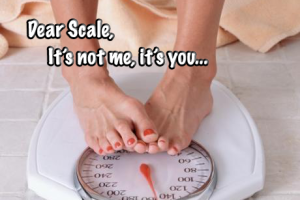 Dear Scale, It’s Not Me, It’s You…
Dear Scale, It’s Not Me, It’s You…
We’re not right for each other. You bring me down. I work so hard but you never change; it upsets me. Goodbye bathroom scale – it’s over.
For some people, weighing oneself is a helpful tool to maintain weight. These individuals are encouraged by the number they see on the scale, but aren’t fixated on it. It is nothing more than a simple reality check, like checking a bank statement.
Many others may see the scale as a source of anxiety and frustration, which can take a serious toll on self-worth. It can trigger a cascade of feelings, including judgment and self-doubt, which can lead to emotional and disordered eating and body image issues. If you feel like you’re becoming too married to your scale, here are 5 reasons why it might be worth taking some time apart.
1. Your weight doesn’t tell the whole story
When you are eating right and increase your activity levels, it can change the way your clothes fit, improve the quality of your skin, and increase your energy level and endurance. But the scale does not show those changes. Focusing all of your attention on that number masks meaningful results from your hard work and effort.
Moreover, over the course of the day (or even a few hours!) weight can fluctuate by 1-4kg depending on your clothing, food and fluid intake, physical activity levels, hydration status, hormone levels, bowel movements and digestion. Seeing that number jump up on a daily basis says nothing about the fat or muscle mass that you have gained or lost and rather only creates unnecessary stress.
2. Weight does not indicate body composition
Your total weight is made up of lean mass, fat mass and bone mineral content. The number on the scale does not give you any information about these three variables and how their proportions are changing over time. Losing fat and gaining muscle can have a huge impact on how your body looks. Therefore avoid making misinformed assumptions about these variables just by looking at daily changes on the scale.
3. Weight has the potential to create an unhealthy obsession around food
Obsessing about the number on the scale can lead to disordered eating tendencies or an unhealthy relationship with food. Do not let your weight determine whether you are hungry or not. Eliminating daily weigh-ins will allow you to listen your body’s signals: eat when you’re hungry and to stop when you’re satisfied. Food is nourishment and fuel for your body, not a substance that affects the number on a scale.
Secondly, remember that food is not the only factor affecting your weight – sleep, recovery from activity, psychological stress and health history all play a major role in body composition. But no one looks at the scale and thinks, ‘I need to get more sleep!’.
4. Your weight should not dictate your self-esteem
Does your morning ritual of jumping on the scales determine whether you have a good or bad day? If so, this is perhaps the most important reason to call quits with your scale. It’s psychologically unhealthy to allow a number to determine your self-worth, value and self-esteem. Life is better than counting calories and losing weight. Focus on caring and loving your body by making healthy choices that make you feel good.
5. There are plenty more metrics in the sea
There are other measures of success that can keep you motivated towards your health goals, such as fitness tests, circumference measurements, progress pictures and fitting clothes. Stay focused on the prize, keep yourself accountable and find a more informative and motivating method to measure your progress at predetermined intervals so you can celebrate your wins.





Share your thoughts...